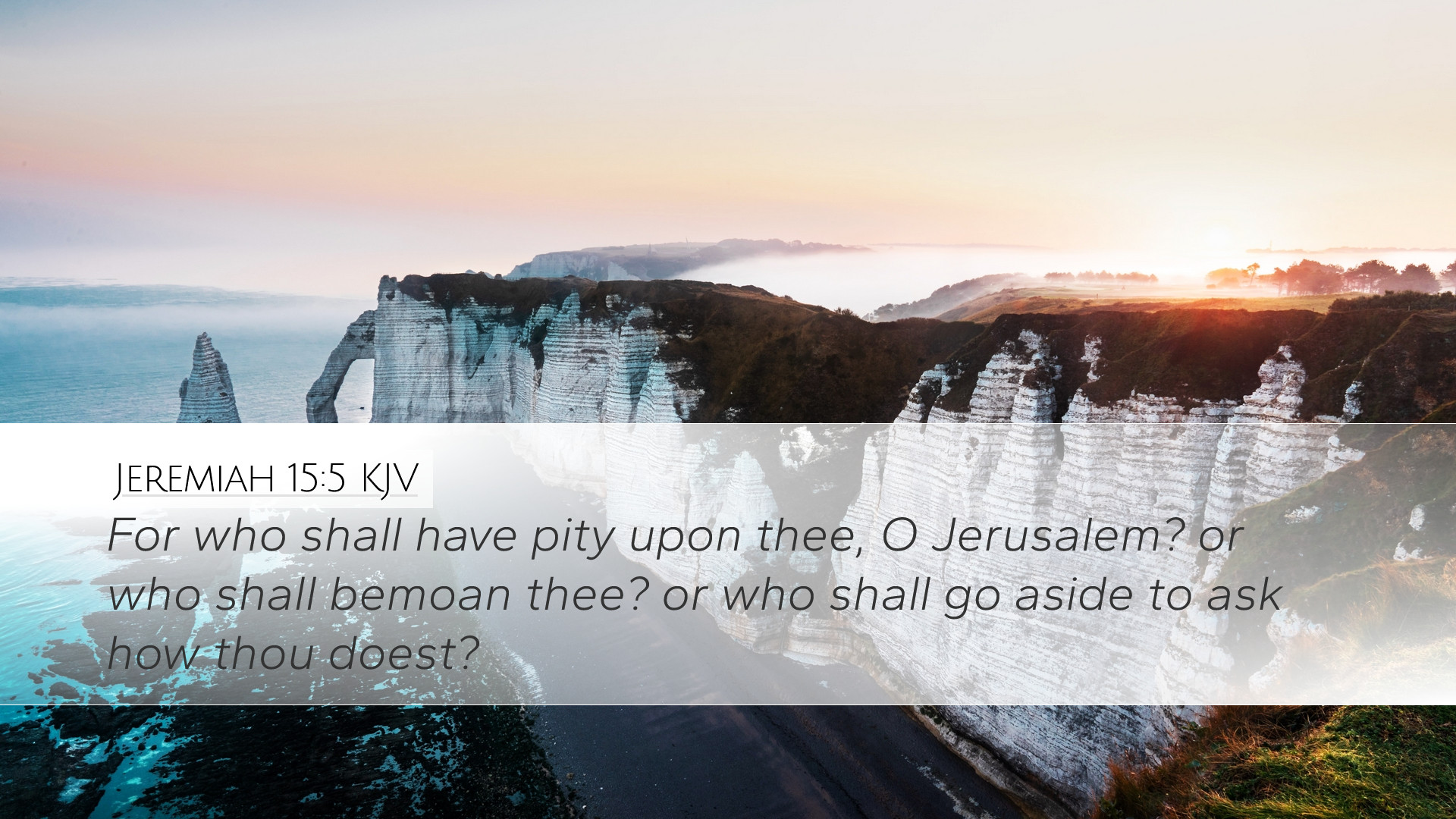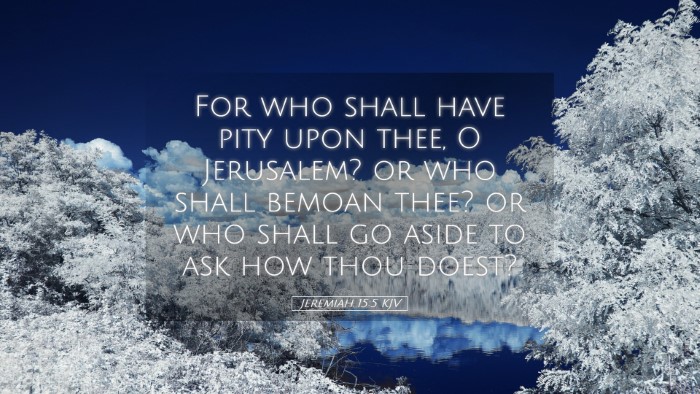Commentary on Jeremiah 15:5
Verse: "For who will have pity on you, O Jerusalem? Or who will bemoan you? Or who will turn aside to ask about your welfare?" (Jeremiah 15:5, ESV)
Introduction
The verse Jeremiah 15:5 captures a moment of profound lamentation for Jerusalem during a time of great decline and impending judgment. Jeremiah, as the prophet, voices the sorrow not only for the city but also for a people who have turned away from God. This commentary synthesizes insights from Matthew Henry, Albert Barnes, and Adam Clarke to explore the theological implications and pastoral applications of this verse.
The Context of Jeremiah 15:5
Jeremiah's ministry took place during a tumultuous time in Israel's history, marked by sin, disobedience, and the foretelling of God’s judgment. As a prophet, Jeremiah was tasked with conveying God’s message, which often revolved around themes of repentance and warning. In this verse, the prophet symbolizes not just his grief, but God’s sorrow over His unfaithful people.
Insights from Matthew Henry
According to Matthew Henry, this verse illustrates the complete desolation of Jerusalem and reflects on the lack of compassion found among its former friends. Henry emphasizes the severe consequences of the people’s rebellion against God, highlighting:
- The Absence of Pity: Henry points out that the absence of those who would show pity corresponds to God's judgment. As Israel has turned away from the Lord, so too have their allies turned away.
- Isolation in Desolation: Jerusalem’s plight represents the ultimate isolation that results from sin. Henry notes that people who once looked to Jerusalem for guidance and support would no longer feel compelled to do so.
- The Despair of Prophetic Voice: Jeremiah is left in a position where he voices God’s sorrow for His people, amplifying the lament—no one cares enough to ask about their welfare.
Perspectives from Albert Barnes
Albert Barnes elaborates on the rhetorical nature of the questions posed in this verse. He notes that each question indicates a spiritually dark reality. Key points from Barnes' commentary include:
- Rhetorical Questions: Barnes interprets these inquiries as having no expected answer; they highlight the utter despair in Jerusalem’s situation.
- Symbolism of Jerusalem: The city represents the people of God. The neglect of Jerusalem reflects the broader neglect of God’s covenant with His people.
- The Call for Repentance: Barnes sees the desolate state of Jerusalem as an urgent call for repentance and a return to the covenant relationship with God as the only hope.
Insights from Adam Clarke
Adam Clarke provides a historical and linguistic perspective on this verse. His observations include:
- Historical Context: Clarke stresses the significance of Jerusalem in the religious life of Israel. Its impending doom arises from their failure to observe God’s laws.
- Language and Meaning: He delves into the original Hebrew, underscoring the gravity of abandonment felt by the prophet as he laments his city.
- Impact of Leadership: Clarke highlights the role of leaders in guiding their people. The failure of leaders in Jerusalem to lead by righteousness contributed to the collective decline.
Theological Reflection
This verse serves as a powerful reminder of God’s desire for relationship with His people. The absence of anyone to show pity reflects a severed relationship caused by sin. Theological reflections include:
- The Nature of God's Justice: God's justice is evident as He allows the consequences of sin to unfold for His people.
- The Role of the Prophet: Jeremiah embodies the prophetic call to repent, drawing attention to the dire need for a mediator between God and His people.
- The Hope of Restoration: Despite the grim reality, the narrative of Jeremiah ultimately points toward hope and restoration for those who turn back to God.
Pastoral Application
For pastors and church leaders, this verse can guide reflection on the pastoral responsibility to seek the welfare of their communities. Critical applications include:
- Encouragement to Intercede: Like Jeremiah, pastors are called to intercede for their communities and help shepherd them back to faith.
- Recognizing Spiritual Desolation: This passage urges leaders to be vigilant in recognizing signs of spiritual desolation among their congregants.
- Promoting Compassion and Care: It serves as a call to nurture a caring community that is quick to extend compassion both to its members and surrounding neighbors.
Conclusion
Jeremiah 15:5 serves as a poignant reminder of the devastation that follows disobedience to God. Through the combined insights of Matt Henry, Albert Barnes, and Adam Clarke, one can appreciate the rich texture of this passage as it encourages both self-reflection and a recommitment to God. It calls for empathy within the community and underscores the vital need for intercession, acknowledgment of God’s holiness, and the transformative power of repentance.


